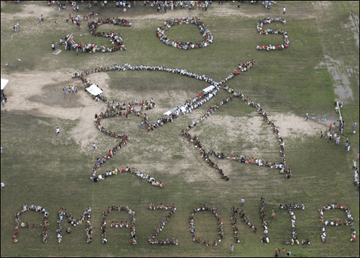Gathering at the World Social Forum in Belem, Brazil, indigenous people from across Latin America today called upon world leaders to protect the Amazon rainforest which is under continued threat from loggers, ranchers, and agroindustrial companies. Nearly 12,000 square kilometers (4,600 sq miles) of Amazon rainforest were destroyed last year while another 25,000 square kilometers were damaged or degraded.
More than 1000 forum participants formed a human banner that spelled out the message “SALVE A AMAZONIA” (“Save the Amazon” in Portuguese) around a silhouette of an indigenous warrior taking aim with a bow and arrow.
“We are the guardians of the forest,” said Marco Apurina, Vice-Coordinator of COIAB, an indigenous umbrella organization. “This is a critical moment for Indigenous peoples to unite with non-Indigenous, activists, teachers, environmentalists, unions, government—the Amazon rainforest needs everyone to work together now to defend it before it’s too late.”
 The human banner. Image courtesy of the Rainforest Action Network (RAN). |
“It is urgent that the world act now to stop deforestation and to recognize the importance of the Amazon in stabilizing our climate,” added Atossa Soltani, Executive Director Amazon Watch, a group that is fighting to protect the rights of indigenous people against oil companies that have polluted, degraded, and destroyed the Amazon rainforest. “There needs to be an immediate halt to industrial resource extraction that is bringing the ecosystems and cultures of the Amazon to the brink of collapse.”
Participants kicked off the ninth World Social Forum with a walk through the streets of Belem, a city near the mouth of the Amazon river. More than 100,000 joined the parade.
The World Social Forum is the environmental and social justice community’s response to the World Economic Forum in Davos, which caters to bankers. Last year’s event was held in over 80 countries.
Related articles
REDD may harm forest people, alleges report
(12/02/2008)
A new report finds that the World Bank is not doing enough to protect indigenous rights under its mechanism to reduce emissions from deforestation and forest degradation (REDD).
Carbon conservation schemes will fail without forest people
(10/16/2008)
Mechanisms that use forest conservation to reduce greenhouse gas emissions are doomed to fail unless they are “based on respect for the rights of indigenous peoples and forest communities,” warn environmentalists and indigenous rights groups meeting in Oslo this week. Indigenous groups fear they are being excluded from discussions on Reduced Emissions from Deforestation and Forest Degradation (REDD), a proposed financial mechanism that would compensate tropical countries for reducing emissions caused by deforestation and land use. Such emissions account for a fifth of the global total, or more than the total emissions from transportation. In particular, indigenous groups and forest communities are concerned they will not see benefits from REDD. Worse, some believe the mechanism could trigger a new wave of land grabs and evictions by parties seeking to capitalize on carbon payments. Indigenous groups and forest communities have long struggled against development interests seeking to exploit their traditional lands and resources. But supporters of so-called “avoided deforestation” schemes say that properly-designed policy offers unprecedented opportunities to create sustainable livelihoods for forest people while safeguarding biodiversity and services provided by healthy forest ecosystems.







